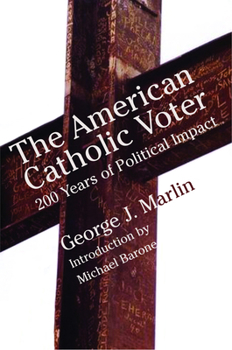American Catholic Voter: Two Hundred Years of Political Impact by George J Marli
Select Format
Select Condition 
Book Overview
George J. Marlin, author of "Fighting the Good Fight: A History of the New York Conservative Party," traces the political and electoral history of American Catholics from the time of Lord Baltimore and the founding of Maryland to the election of George W. Bush. It is an inspiring story of ethnic Catholics who arrived on America's shores with only the clothes on their back to eventually become a significant voice in local and national political affairs.
Format:Hardcover
Language:English
ISBN:1587310236
ISBN13:9781587310232
Release Date:September 2004
Publisher:St. Augustine's Press
Length:400 Pages
Weight:1.70 lbs.
Dimensions:1.5" x 6.1" x 9.3"
Customer Reviews
2 ratings
This Book Makes An Impact, Too
Published by Thriftbooks.com User , 19 years ago
George J. Marlin is a former Conservative Party candidate for Mayor of New York and author of books on the history of the New York State Conservative Party to the works of G.K. Chesterton. In "The American Catholic Voter: 200 Years of Political Impact" Marlin has written a magnus opus for Catholic political interests in America. Marlin traces the influence of Catholics by focusing on their size relative to the American population, their respective percentages in the two main political parties, and their presence in large, key swing states or cities. Anti-Catholicism was once described by historian Arthur Schlesinger Sr. as the "the most deep-seated prejudice in the American conscience" mainly due to Protestant fears of domination by Rome. In colonial times, Catholics were often forbidden to vote, own land, or hold public office unless they publicly denounced the Pope and agreed not to attend Mass. Priests could be arrested for preaching. Many of the great early American Founding Fathers were either outright anti-Catholic or pandered to anti-Catholic sentiment for political expediency. By 1790, Catholics were only 1% of the U.S. population. Legal and formal colonial anti-Catholicism gradually melted away during the 1800's and Catholics gradually improved their socioeconomic and political fortunes. By 1840, just prior to the great waves of Irish and German Catholic waves of immigration, Catholics numbered just under 5% of the U.S. population, a 400% increase in 50 years. Many anti-Catholic laws were repealed during this time, but Catholics still had to tread very carefully. A recurring theme is the guiding principle by which Catholics survived and prospered from colonial times, namely the principle of subsidiarity. This governing philosophy held that problems of governance and society were best handled at the local (or parish) level. Not only were there formal Catholic papal pronouncements emphasizing local control over federal domination, but it was at the local level that small Catholic communities thrived. Catholic neighborhoods, Catholic parishes, and Catholic schools were all within walking distance for the millions of new Catholic immigrants who arrived from 1850-1924. The Catholic percentage of the U.S. population increased from 15% in the 1870's and crossed the 20% threshold in 1900. As Catholics increased their presence in large cities, they elected local politicians who used increased Catholic voting clout to establish positions of power in both the Democratic and Republican Parties. Since most Catholics were living in large cities, they tended to vote Democratic and most of the successful inner-city Catholic leaders were Democrats. But the total Catholic vote was very fluid depending on the candidates, positions on issues of concern to Catholics (parochial school aid, support for Nativist groups, etc), and the ethnic attachments. Irish and Italians in the Northeast would sometimes vote very differently from Germans or
The Definitive History
Published by Thriftbooks.com User , 20 years ago
The role of the Catholic voter in American elections since at least the time of Jefferson has been critical in determining outcomes--even when Catholics themselves were barely accepted as Americans. Today, when Catholics are disunified (traditionalists, "cafeteria Catholics"--as Marlin aptly calls them--and Hispanics), the Catholic vote remains very important, perhaps especially so in a presidential race in which one of the candidates is (nominally) Catholic. This is a fascinationg book; thorough and honest and readable.





